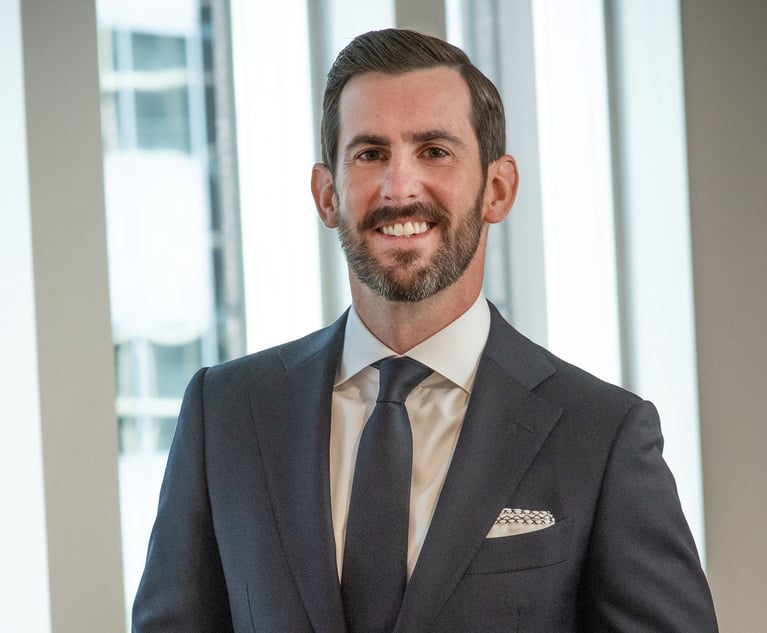Phila. Mass Torts Inventory Could Soon Be on Decline, Judge Says
The Reglan litigation came to a settlement last year, and, according to the judge tasked with presiding over the city's mass torts programs, the court is entering the final stages of administering that settlement.
February 07, 2018 at 05:07 PM
7 minute read
 Philadelphia City Hall. Photo: Shutterstock
Philadelphia City Hall. Photo: Shutterstock The number of cases pending in Philadelphia's Complex Litigation Center has reached an all-time high, but the inventory could see a significant dip over the next several months, thanks to one of the court system's largest mass torts program recently resolving.
The Reglan litigation came to a settlement last year, and, according to the judge tasked with presiding over the city's mass torts programs, the court is entering the final stages of administering that settlement. Once that occurs, the more than 2,000 Reglan cases will be taken out of the system.
“Those will be coming off the dockets,” Philadelphia Court of Common Pleas Judge Arnold New said. “It's taking time, but it will disappear by the end of the year or sooner.”
Attorney Bill Curtis of the Curtis Law Group, a lead attorney for the plaintiffs in the Reglan litigation, said the litigation is in the “distribution and dismissal stage.”
“The process is pretty much streamlined at this point,” he said. “Hopefully by the time we get to the summer, it will be closing all the way down.”
The most recent statistics from the Complex Litigation Center showed that the mass torts inventory skyrocketed over the past year. According to the numbers, the overall inventory jumped 77 percent from 6,196 at the beginning of 2017 to 10,984 by December, and the pharmaceutical-based programs increased 85.6 percent from 5,601 to 10,395.
The largest increase, by far, came from the Risperdal mass tort program, which grew by 219 percent last year. With 6,200 Risperdal cases pending in the court, the program makes up 56.4 percent of the Complex Litigation Center's total inventory.
The second-largest program is Reglan, which takes up 18.9 percent of the inventory. According to the latest numbers, there are 2,073 Reglan cases on the docket. That number is down slightly from the 2,165 cases that were pending at the start of the year.
New said that, although the parties agreed to resolve the litigation last year, Reglan is unique because it involves more than 50 defendants who made a generic version of the drug, so the administrative task of implementing the settlement has been more complicated. He noted that, with more than 2,000 plaintiffs and about 50 defendants, the mere task of getting all the parties to sign all the releases has its difficulties.
Curtis added that the age of the litigation has added to the complexity, since some of the original plaintiffs have died, which means parties have had to track down surviving spouses and children. Additional issues like bankruptcies and liens have also complicated things, he said.
“This one's been pretty complicated, but the good news is it's reaching the very end,” he said.
Reglan cases in the Complex Litigation Center have held steady at about 2,300 over the past five years, and for much of that time it was the largest mass tort program in the court.
The Risperdal program, however, eclipsed the Reglan program last year.
According to Thomas R. Kline of Kline & Specter, who is one of the lead attorneys handling the Risperdal litigation, the growth of the Risperdal mass tort is due to a tolling agreement that defendant Janssen Pharmaceuticals ended in late 2016. As a result of that agreement ending, thousands of plaintiffs had to file their suits to avoid losing their claims due to the statute of limitations expiring, Kline said.
With Risperdal's rise, the mass tort inventory have reached record heights—far higher than levels had been in 2012 when the court implemented changes to the Complex Litigation Center that were aimed at addressing a backlog and rising inventory. Some of the changes included ending reverse bifurcation of cases, and restricting the consolidation of pharmaceutical cases.
Kline said the rising numbers pose a challenge to the courts, but he said the Risperdal cases all are meritorious and that Philadelphia is a proper venue for the cases to be filed, especially in light of the U.S. Supreme Court's ruling last year in Bristol Myers-Squibb v. Superior Court of California, which limited the state jurisdictions where national companies can be sued.
“The plaintiffs have actually chosen the home field of the defendants. They have chosen to sue the defendants where they are registered as a corporation,” Kline said.
Kline added that every case involves a plaintiff who was allegedly injured, and suggested that consolidating the cases for trial would be one way to speed up resolution of the program and “give the respective plaintiffs their day in court.”
Curt Schroder, executive director of the Pennsylvania Coalition for Civil Justice Reform, pointed to the numerous multimillion-dollar verdicts that came out of mass torts in the past few years, and said the increasing numbers appear to be due to “litigation tourism.”
“They're attracted by these huge jury verdicts that would seem to be out of sync with reality, I would say,” he said.
The number of plaintiffs living outside Pennsylvania who filed suit in Philadelphia court may support that claim. In 2016, 74 percent of the new cases filed in Philadelphia were filed by plaintiffs from outside the Keystone State. That number was a record low since the court started measuring that statistic in 2005. However, 2017 saw a record-high number of out-of-state plaintiffs, with 90 percent of the cases coming from outside Pennsylvania.
Schroder said he did not think there needed to be additional programmatic changes to the Complex Litigation Center, but said Pennsylvania should put limits on the ability for plaintiffs to obtain punitive damages and should revamp its laws regarding venue.
New said the rising numbers are largely out of the court's control. As an example, he said jurisdictional considerations, including the Bristol Myers-Squibb decision, may lead to even more cases coming to Philadelphia.
The rise in Risperdal, he said, is also not going to result in changes to the court's protocols, and, despite Philadelphia being named a “Judicial Hellhole” by the American Tort Reform Association, he said he will continue to “ play it down the middle.”
“I'm as uninfluenced by being called a Judicial Hellhole as I am by having any plaintiff's organization call me whatever they want to call me,” he said.
New said the court is taking a “proactive” approach to managing the dockets.
Along with having regular meetings between the parties in each program, New said the court has taken steps to ensure that the parties maintain a detailed understanding of all the cases as they come in—including dates of ingestion, label changes and the ages of the plaintiffs. Understanding those intricacies, New said, gives the parties a better understanding of a litigation's strengths and weaknesses, which helps facilitate realistic settlement discussions.
“It's built on the concept of resolution,” he said. “The purpose is to have cases that are similar in nature, so the parties can work out a resolution. That hasn't happened with the bulk of Risperdal, but ultimately, it has to.”
This content has been archived. It is available through our partners, LexisNexis® and Bloomberg Law.
To view this content, please continue to their sites.
Not a Lexis Subscriber?
Subscribe Now
Not a Bloomberg Law Subscriber?
Subscribe Now
NOT FOR REPRINT
© 2025 ALM Global, LLC, All Rights Reserved. Request academic re-use from www.copyright.com. All other uses, submit a request to [email protected]. For more information visit Asset & Logo Licensing.
You Might Like
View All
Pa. High Court: Concrete Proof Not Needed to Weigh Grounds for Preliminary Injunction Order
4 minute read

With New Civil Jury Selection Rule, Litigants Should Carefully Weigh Waiver Risks
6 minute read
Litigating the Written Word: Parol Evidence Rule and the Gist of the Action Doctrine in Fraud Claims
6 minute readTrending Stories
Who Got The Work
J. Brugh Lower of Gibbons has entered an appearance for industrial equipment supplier Devco Corporation in a pending trademark infringement lawsuit. The suit, accusing the defendant of selling knock-off Graco products, was filed Dec. 18 in New Jersey District Court by Rivkin Radler on behalf of Graco Inc. and Graco Minnesota. The case, assigned to U.S. District Judge Zahid N. Quraishi, is 3:24-cv-11294, Graco Inc. et al v. Devco Corporation.
Who Got The Work
Rebecca Maller-Stein and Kent A. Yalowitz of Arnold & Porter Kaye Scholer have entered their appearances for Hanaco Venture Capital and its executives, Lior Prosor and David Frankel, in a pending securities lawsuit. The action, filed on Dec. 24 in New York Southern District Court by Zell, Aron & Co. on behalf of Goldeneye Advisors, accuses the defendants of negligently and fraudulently managing the plaintiff's $1 million investment. The case, assigned to U.S. District Judge Vernon S. Broderick, is 1:24-cv-09918, Goldeneye Advisors, LLC v. Hanaco Venture Capital, Ltd. et al.
Who Got The Work
Attorneys from A&O Shearman has stepped in as defense counsel for Toronto-Dominion Bank and other defendants in a pending securities class action. The suit, filed Dec. 11 in New York Southern District Court by Bleichmar Fonti & Auld, accuses the defendants of concealing the bank's 'pervasive' deficiencies in regards to its compliance with the Bank Secrecy Act and the quality of its anti-money laundering controls. The case, assigned to U.S. District Judge Arun Subramanian, is 1:24-cv-09445, Gonzalez v. The Toronto-Dominion Bank et al.
Who Got The Work
Crown Castle International, a Pennsylvania company providing shared communications infrastructure, has turned to Luke D. Wolf of Gordon Rees Scully Mansukhani to fend off a pending breach-of-contract lawsuit. The court action, filed Nov. 25 in Michigan Eastern District Court by Hooper Hathaway PC on behalf of The Town Residences LLC, accuses Crown Castle of failing to transfer approximately $30,000 in utility payments from T-Mobile in breach of a roof-top lease and assignment agreement. The case, assigned to U.S. District Judge Susan K. Declercq, is 2:24-cv-13131, The Town Residences LLC v. T-Mobile US, Inc. et al.
Who Got The Work
Wilfred P. Coronato and Daniel M. Schwartz of McCarter & English have stepped in as defense counsel to Electrolux Home Products Inc. in a pending product liability lawsuit. The court action, filed Nov. 26 in New York Eastern District Court by Poulos Lopiccolo PC and Nagel Rice LLP on behalf of David Stern, alleges that the defendant's refrigerators’ drawers and shelving repeatedly break and fall apart within months after purchase. The case, assigned to U.S. District Judge Joan M. Azrack, is 2:24-cv-08204, Stern v. Electrolux Home Products, Inc.
Featured Firms
Law Offices of Gary Martin Hays & Associates, P.C.
(470) 294-1674
Law Offices of Mark E. Salomone
(857) 444-6468
Smith & Hassler
(713) 739-1250





